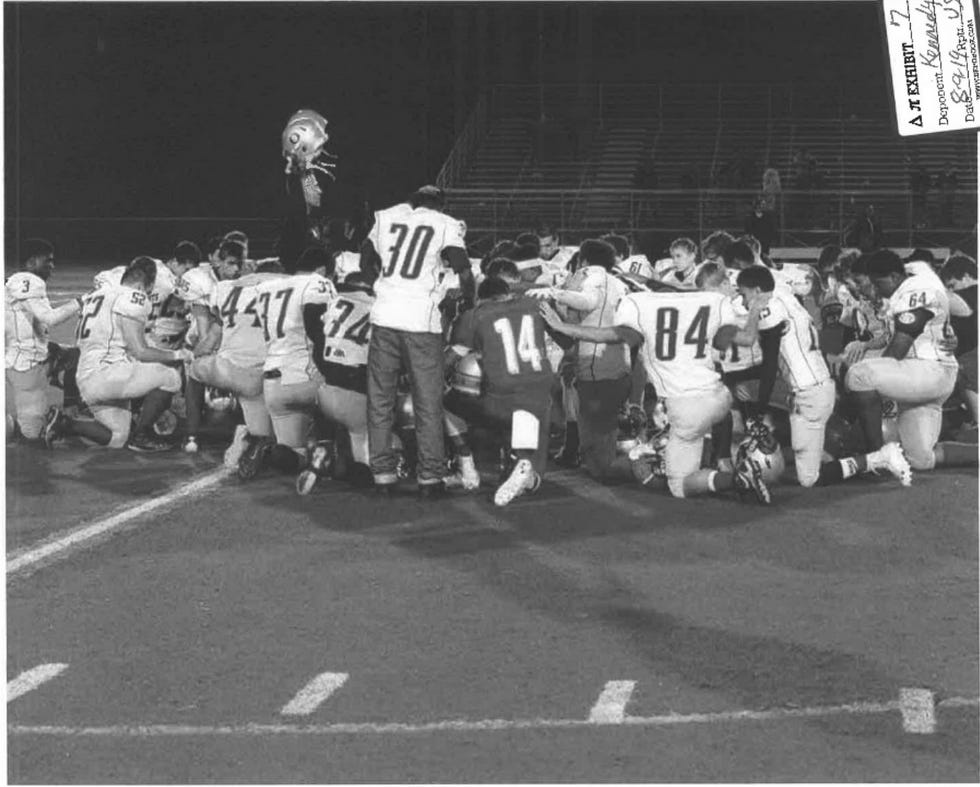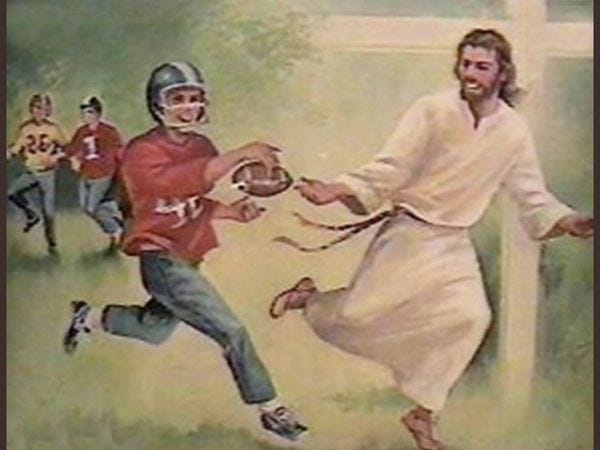SCOTUS: School Prayer Awesome, Establishment Clause For Decorative Purposes Only
It just gets worse and worse and worse.
We are hurtling toward theocracy at a dizzying speed. Last week, the Supreme Court ruled that religious schools could receive public funds — as in, the state must take money from everyone and give it to religious schools so they can teach kids Jesus hung out with dinosaurs. Then, on Friday, the justices ruled that states may force the Christian religion on people by barring them from having abortions.
Today, the court threw the Establishment Clause out the window to find in favor of Washington state high school football coach Joe Kennedy and his right to pray on the field after games. Kennedy had a history of trying to impose prayer on his players and had previously been reprimanded for conducting pre-game prayers in the locker room. Although he stopped this, he continued praying on the 50-yard line after games, and was asked by school officials to not do this if it was disruptive or involved students. Kennedy refused.
This was obviously an issue, because the courts have found over and over again that this sort of behavior from public school teachers and those in positions of authority is coercive and therefore an obvious violation of the Establishment Clause.
As a result of his behavior, a school official suggested not renewing his contract for the next year, and Kennedy did not reapply for the position. This is, of course, very different from being fired, but the Supreme Court chose not to see it that way. They determined this violated his freedom of religion.
The vote was 6-3, panning out exactly as you imagine. In order to do this, the Court basically overruled Lemon v. Kurtzman, which famously established the three-prong Lemon test to determine violations of the Establishment clause:
The statute must have a secular legislative purpose. (Also known as the Purpose Prong)
The principal or primary effect of the statute must neither advance nor inhibit religion. (Also known as the Effect Prong)
The statute must not result in an "excessive government entanglement" with religion. (Also known as the Entanglement Prong)
They have instead chosen to replace that test with a new "history and tradition" test. What is that test? Well, they can't tell you. It's a secret! It's whatever they decide it is that particular day.
As Justice Sonia Sotomayor explained in her dissent:
Upon overruling one “grand unified theory,” the Court introduces another: It holds that courts must interpret whether an Establishment Clause violation has occurred mainly “by ‘reference to historical practices and understandings.’” [...]
The Court reserves any meaningful explanation of its history-and-tradition test for another day, content for now to disguise it as established law and move on. It should not escape notice, however, that the effects of the majority’s new rule could be profound. The problems with elevating history and tradition over purpose and precedent are well documented. See Dobbs, 597 U. S., at ___ (BREYER, SOTOMAYOR, and KAGAN, JJ., dissenting). [...]
For now, it suffices to say that the Court’s history-and tradition test offers essentially no guidance for school administrators. If even judges and Justices, with full adversarial briefing and argument tailored to precise legal issues, regularly disagree (and err) in their amateur efforts at history, how are school administrators, faculty, and staff supposed to adapt? How will school administrators exercise their responsibilities to manage school curriculum and events when the Court appears to elevate individuals’ rights to religious exercise above all else? Today’s opinion provides little in the way of answers; the Court simply sets the stage for future legal changes that will inevitably follow the Court’s choice today to upset longstanding rules.
Notably, the word "private" occurs 42 times in the opinion, which is rather interesting given that all of the justices ruling in favor of Coach Kennedy ruled last week in the abortion case that there is no constitutional right to privacy. The Court's opinion, written by Neil Gorsuch, and a concurring opinion by Samuel Alito both took special care to impart that all Coach Kennedy was doing was having a little private moment to himself to pray after games in a non-disruptive manner.
Gorsuch wrote:
Joseph Kennedy lost his job as a high school football coach because he knelt at midfield after games to offer a quiet prayer of thanks. Mr. Kennedy prayed during a period when school employees were free to speak with a friend, call for a reservation at a restaurant, check email, or attend to other personal matters. He offered his prayers quietly while his students were otherwise occupied. Still, the Bremerton School District disciplined him anyway. It did so because it thought anything less could lead a reasonable observer to conclude (mistakenly) that it endorsed Mr. Kennedy’s religious beliefs.
Justice Sotomayor, however, noted in her dissent that while the conservative majority had to pretend Kennedy's post-game prayers were quiet, solemn, personal, private and non-disruptive, that was some bullshit, as demonstrated by this picture of him leading the post-game prayer in a rather dramatic fashion.

It should also be noted that the last court to hear this case also agreed that was some bullshit.
The school district noted that a judge on the U.S. Court of Appeals for the Ninth Circuit, in San Francisco, had criticized what he called “a deceitful narrative” created by Mr. Kennedy’s lawyers.
Mr. Kennedy was never disciplined for offering silent, private prayers, the judge, Milan D. Smith Jr. , wrote last year. Instead, the judge wrote of one game, Mr. Kennedy “prayed out loud in the middle of the football field” just after it finished, “surrounded by players, members of the opposing team, parents, a local politician and members of the news media with television cameras recording the event, all of whom had been advised of Kennedy’s intended actions through the local news and social media.”
But the Supreme Court in its current formation does not care.
This is a very big deal. Since the Court's 1962 decision in Engel v. Vitale, it has been well-established that school prayer is considered a violation of the Establishment Clause and therefore illegal. However, with this decision, the decision last week to force school districts to fund private religious schools, and the death knell of the Lemon Test, that precedent is very likely not long for this world.
The thing is, American conservatives don't just want football coaches to be able to say special silent prayers to themselves, and they don't just want prayer in schools. They want a goddamned theocracy. They want to live in a world where everyone is required to practice their religion whether they believe it or not.
The current Supreme Court is clearly excited to help them out.
[ New York Times ]
Do your Amazon shopping through this link, because reasons .
Wonkette is independent and fully funded by readers like you. Click below to tip us!




It isn't name calling when that's what they did, and it fucked over the whole country. And likely the country wouldn't have stood for a Court seat being left vacated for 4 years on top of a second one, and then a third.
And when you pray, do not be like the hypocrites, for they love to pray standing in the synagogues and on the street corners to be seen by others. Truly I tell you, they have received their reward in full.
Words of Jesus, Matthew 6:5.